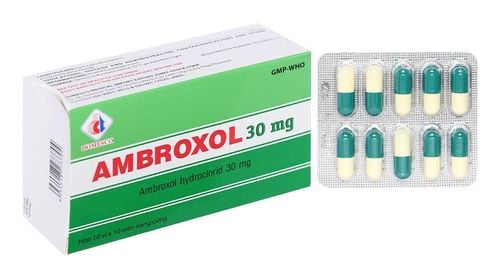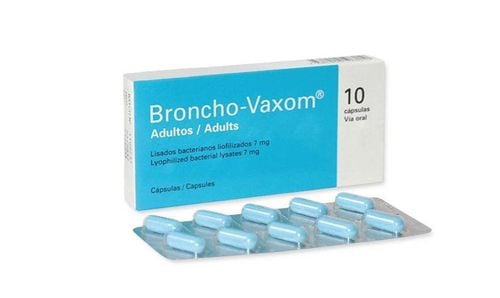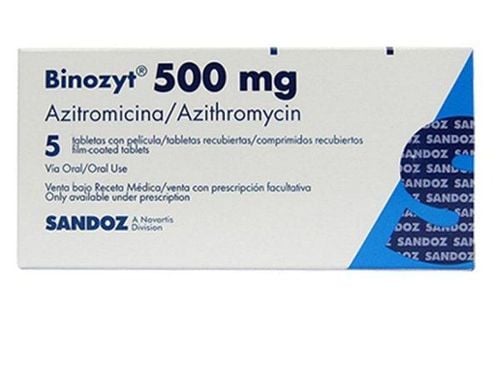Lincomycin 500mg is formulated as hard capsules and is prescribed for the treatment of severe infections caused by susceptible bacteria, including those affecting the ears, nose, throat, bronchial tubes, lungs, and teeth. However, Lincomycin 500mg may cause side effects during treatment, such as nausea, vomiting, diarrhea, and hives. Therefore, patients should thoroughly understand the medication and adhere to their doctor’s instructions before using Lincomycin 500mg.
1. Mechanism of Action of Lincomycin 500mg
What is the effect of Lincomycin 500mg?
Lincomycin 500mg contains the active ingredient lincomycin, which belongs to the lincosamide antibiotic group. It is derived from the fermentation of Streptomyces lincolnensis or other methods.
How does Lincomycin 500mg work?
Lincomycin 500mg is an antibacterial medication. These antibiotics stop bacteria from making proteins they need to grow and survive. Its mechanism involves binding to the 50S subunit of bacterial ribosomes, similar to macrolides like erythromycin, inhibiting the initial stage of protein synthesis. Specifically, Lincomycin attaches to a part of the bacteria called the "50S ribosome," which is like a protein-making factory. Lincomycin primarily has a bacteriostatic effect but can have bactericidal activity against susceptible strains at high concentrations, which also means that Lincomycin disrupts the bacteria’s ability to multiply and can even kill certain bacteria at higher concentrations.
Spectrum of Activity
Lincomycin 500mg is effective against Gram-positive aerobic bacteria, such as Staphylococcus species, which are commonly involved in skin and respiratory infections.
It is ineffective against Enterococcus species or other aerobic bacteria (bacteria that need oxygen to grow).
Lincomycin also has a broad spectrum of activity against anaerobic bacteria (bacteria that thrive without oxygen and are often responsible for deep tissue infections or abscesses) and at high doses can target Gram-negative anaerobes. Additionally, Lincomycin 500mg has some efficacy against certain protozoa (single-celled organisms, such as those causing certain lung infections), making it useful in treating pneumonia.
The minimum inhibitory concentration (MIC - also known as the smallest amount or concentration of an antibiotic that is needed to stop the growth of bacteria) for susceptible strains ranges from 0.05 to 2 mcg/mL.
2. Indications and Contraindications for Lincomycin 500mg
What is Lincomycin 500mg used for?
Lincomycin 500mg is indicated for the treatment of:
- Ear, nose, and throat infections
- Bronchitis and pneumonia
- Dental infections
- Skin infections
- Gynecological infections
- Bone and joint infections
- Post-operative abdominal infections
- Septicemia
- Contraindications
Lincomycin 500mg is contraindicated in patients who:
- Are hypersensitive to its components.
- Have meningitis (inflammation of the brain lining), as the drug does not penetrate cerebrospinal fluid (brain and spinal fluid) effectively.
- Are pregnant.
3. Dosage and Administration of Lincomycin 500mg
How to use Lincomycin 500mg
- Lincomycin 500mg is taken orally, at least one hour before or after meals.
Recommended Dosage
- Adults: 500mg (1 capsule) per dose, taken 3 to 4 times daily.
- Children (including those over 1 month old): 30–60mg/kg/day, divided into multiple doses.
- Patients with severe renal impairment: The dose should be reduced to 25–30% of the normal dose.
Important Notes
- The above dosages are for reference only. Patients must follow their doctor's specific instructions before using Lincomycin 500mg.
- If a dose is missed, take it as soon as possible. However, if the next dose is near, skip the missed dose—do not double up doses. Use reminders or ask family members to help remember doses.
Overdose Management
If an overdose occurs, symptoms such as abdominal pain, nausea, vomiting, diarrhea, fatigue, dizziness, low blood pressure, difficulty breathing, drowsiness, and itching may appear. In such cases, the patient should be taken to a doctor immediately.
4. Side Effects and Precautions for Using Lincomycin 500mg
Possible Side Effects
Lincomycin 500mg, like many medications, can cause side effects during treatment. These effects may vary in severity depending on the individual, ranging from mild to severe.
- Common side effects: These include flushing (redness of the skin), dizziness, and fatigue. These reactions may occur at the start of treatment or after increasing the dosage. They are often temporary and tend to lessen over time.
- Severe or rare side effects: In some cases, Lincomycin 500mg may lead to serious adverse reactions. These could appear shortly after taking the medication (within minutes) or over a few days. Severe side effects include:
- Anaphylaxis (a severe allergic reaction)
- Neutropenia (low white blood cell count)
- Pseudomembranous colitis (severe inflammation of the colon)
- Esophagitis (inflammation of the esophagus, especially when taken orally)
- Elevated liver enzymes (a sign of liver stress)
- Allergic reactions, such as swelling, serum sickness, or kidney dysfunction
- High blood urea levels, reduced urine output, or kidney failure
- Cardiac arrest
If severe side effects occur, the medication should be stopped immediately, and the patient must seek medical help right away.
While the list above is not exhaustive, any unusual symptoms during treatment should be reported to a doctor or healthcare professional.
Precautions When Using Lincomycin 500mg
- For Digestive System Disorders:
- Patients with a history of colitis (inflammation of the colon) should use Lincomycin with caution, as it may worsen gastrointestinal conditions.
- Older adults and women may experience severe diarrhea or pseudomembranous colitis during treatment.
- For Allergic Reactions:
Individuals with known allergies should be cautious, as Lincomycin may exacerbate existing allergic conditions. - For Liver and Kidney Function:
Patients with severe liver or kidney impairment need adjusted doses to prevent drug accumulation and adverse effects. - Long-term Use: For prolonged treatments, especially in children, regular monitoring of liver function and blood counts is essential.
- Pregnancy and Breastfeeding:
Animal studies suggest no evidence of birth defects, but there is limited research on Lincomycin’s effects on human pregnancies. It crosses the placenta and can reach up to 25% of the mother’s serum concentration in the umbilical cord.
Lincomycin may be excreted in breast milk, potentially causing side effects in breastfeeding infants. - Drug Interactions:
Gentamicin (another antibiotic): Lincomycin does not affect its pharmacokinetics, but safety when used together remains unclear.
Kaolin (anti-diarrheal): May reduce the absorption of Lincomycin.
Theophylline (used for respiratory conditions): No known interactions.
Oral contraceptives: Effectiveness may be decreased due to changes in gut bacteria.
Neuromuscular blocking drugs: Use with caution, as Lincomycin can enhance their effects.
Erythromycin (another antibiotic): Avoid combining, as the two drugs can counteract each other. - Proper Use
Lincomycin 500mg is available as hard capsules and is prescribed for treating severe infections caused by susceptible bacteria, including those affecting the ears, throat, lungs, teeth, and more. To ensure effectiveness and avoid side effects, always follow the doctor or pharmacist’s instructions precisely.
For additional health information, visit trusted medical websites like Vinmec International General Hospital's website to stay informed about health, nutrition, and wellness for yourself and your loved ones.
Please call HOTLINE or make your reservation directly HERE to arrange an appointment. You may also download the MyVinmec app to schedule appointments faster and conveniently manage your reservations.













